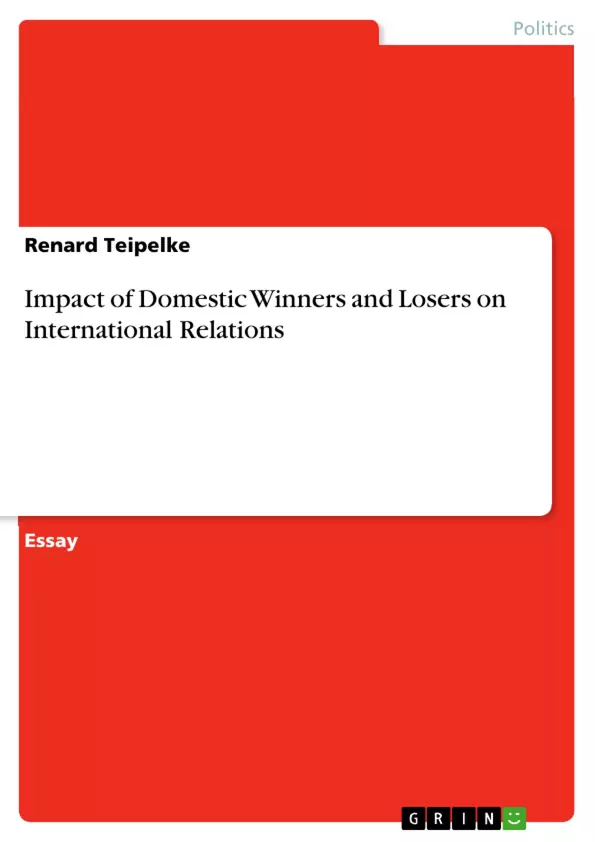In the analysis of international relations, states are often described as single actors cooperating and/or bargaining with each other. However, a closer look at domestic forces reveals their impact on a country’s leadership to act on the international level in a certain way. In the following essay, I will explain what impact domestic winners and losers can have on making cooperation or conflict between states more likely. I will show that narrow interests of (prospective) winners or losers are hardly able to influence a country’s general interest for national security or economic progress, but can make themselves heard in particular policy fields. By structuring the discussion along the issue areas of war, globalization, and environment, I will explain the relevance of power structures as well as political systems for domestic winners and losers’ potential to influence international interactions.
Inhaltsverzeichnis (Table of Contents)
- Introduction
- War: special interests versus the public
- Globalization: coexisting support and impediment of cooperation
- Environment: vague prospects of benefits versus distinct groups of losers
Zielsetzung und Themenschwerpunkte (Objectives and Key Themes)
This essay aims to analyze the influence of domestic winners and losers on international relations, specifically on states' cooperation and conflict. It argues that the narrow interests of these groups can impact a country's foreign policy decisions despite the broader national interest in security and economic progress.
- The role of special interests in shaping state behavior
- The influence of domestic power structures on international relations
- The impact of political systems on the ability of winners and losers to influence foreign policy
- The complexities of cooperation and conflict in specific issue areas like war, globalization, and the environment
- The potential for both winners and losers to support or impede international cooperation.
Zusammenfassung der Kapitel (Chapter Summaries)
- Introduction: Introduces the concept of domestic winners and losers and their potential impact on international relations, emphasizing the need to analyze their influence beyond the traditional state actor model.
- War: special interests versus the public: Explores the impact of domestic groups benefiting from war, such as specific industries or ethnic lobbies, who might influence states to become more belligerent despite potential public opposition and financial costs. The essay also examines the role of different political systems in mediating the influence of such groups.
- Globalization: coexisting support and impediment of cooperation: Discusses the domestic winners and losers arising from trade liberalization and globalization, using the Ricardo-Viner and Stolper-Samuelson models. The essay analyzes the role of political systems in responding to the interests of these groups, highlighting the potential for both support and opposition to international cooperation in the area of globalization.
- Environment: vague prospects of benefits versus distinct groups of losers: Explores the challenges of achieving international cooperation on environmental issues, where winners (benefiting from a cleaner environment and green technology) often face difficulties in advocating for their interests while losers (industries with environmentally harmful practices) have a more powerful voice.
Schlüsselwörter (Keywords)
This essay examines the influence of domestic winners and losers on international relations, focusing on key concepts such as special interests, domestic power structures, political systems, trade liberalization, globalization, environmental policy, and the impact of these factors on state cooperation and conflict.
Frequently Asked Questions
How do domestic interest groups influence a country's foreign policy?
Domestic "winners and losers" can lobby leadership to act in ways that benefit their specific economic or political interests, potentially making international cooperation or conflict more likely.
What is the impact of globalization on domestic winners and losers?
Globalization creates winners (e.g., export-oriented industries) who support cooperation, and losers (e.g., industries threatened by imports) who may push for protectionism and conflict.
Why is international environmental cooperation so difficult?
Potential losers (like heavy industries) often have powerful, concentrated voices, while the winners (the general public or green tech) face vague prospects and are less organized.
Can special interests lead a state into war?
Yes, specific industries or ethnic lobbies that stand to gain from conflict can influence a state to become more belligerent, even if it contradicts the general public interest.
What role do political systems play in mediating these influences?
The political system (democracy vs. autocracy) determines how much access domestic groups have to decision-makers and how sensitive leaders are to public versus special interests.
- Citar trabajo
- Renard Teipelke (Autor), 2010, Impact of Domestic Winners and Losers on International Relations, Múnich, GRIN Verlag, https://www.grin.com/document/153494



